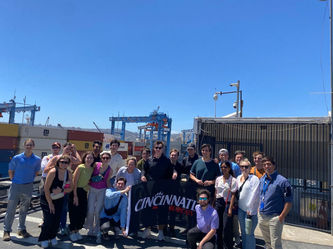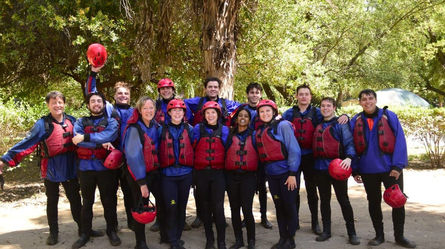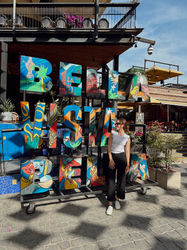
Chile
The Experience
Experience
This course opened my eyes to the nuances of conducting business globally, but my learning didn’t stop in the classroom. After the in-class portion of the class was over, my classmates and I had the opportunity to apply our learning through a cultural immersion in Chile. Observing Chilean culture reveals distinct social norms and values that shape daily life and perspectives. While traveling, I had the opportunity to observe some key cultural differences when looking at language, social dynamics, and family orientation. Noticing these cultural clues allowed me to establish deeper insight into Chilean culture and walk away with a closer connection to the country and its people.
One distinct cultural difference I noticed was Chilean Spanish. Chilean Spanish is known for the use of slang words and phrases, but I did not expect it to be so challenging to understand. While my conversational skills may not be at a native level, I possess a moderate understanding of the Spanish language, having completed three years of high school Spanish. In Chile, however, my Spanish skills were laughable. It was especially revealing during the UDD lecture when we translated sentences into traditional Spanish and then into Chilean slang. There were so many differences!
Another distinct cultural aspect of Chile is social dynamics. In all aspects of the trip, whether it was spending time with the students during free time or talking with company representatives during our plant visits, everyone was very friendly and hospitable. The Chilean culture prioritizes relationships and is less individualistic than the U.S. culture. The custom of greeting others with a kiss on the cheek, which emphasizes social connection, contrasts sharply with a firm U.S. handshake. The UDD students taught us this new greeting style saying it was weird for them to shake hands with friends.
The last cultural clue of family orientation is closely related to the social dynamics of Chilean culture. During conversations with the students at UDD, I noticed the prevalence of strong family ties and the centrality of family to Chilean society. We learned that while in college, it is typical for students to live with their families until they graduate and have a full-time job. While in the U.S. this might be done for financial reasons, it is not the norm. In conversation with one of the UDD students, I asked why this was the case. She said that it revolves around differing ideas of independence. In American culture, the concept of adulthood begins at 18, fostered by factors like more lenient child labor laws and the common practice of moving away for college. She explained that in Chile it is not common to work minimum-wage jobs in high school or move across the country for college. The need for parental support is thus more common along with the prevalence of strong familial ties.
Reflection
When looking at these cultural differences, to understand why they exist and what purpose they serve, it is important to look at the history of Chile. While the U.S. was colonized by British settlers, South America was colonized by the Spanish. The influence of Spanish settlers forms a distinct cultural difference in terms of religion, language, and customs which are still heavily prevalent in Chilean culture. The purpose of these cultural norms is to reinforce the cultural prioritization of collectivism. Looking at language, social customs, and familial ties, each fosters a strong sense of community and connection to those around you. I think this collectivist mindset holds extreme value when it comes to fostering a sense of belonging and community support within a group. I know I am not only speaking for myself when I say that I felt extremely welcomed as a tourist in Chile and formed a strong connection with the country and the people I met.
Personal Reflection
My study abroad experience allowed me to develop my confidence and adaptability. My 10 days exploring Chile challenged me to navigate unfamiliar situations while embracing a new perspective and culture. The opportunity for immersion allowed me to strengthen my connection with people from across cultures and I am walking away from this trip facing deep personal growth.
The pictures below show moments from my trip


























